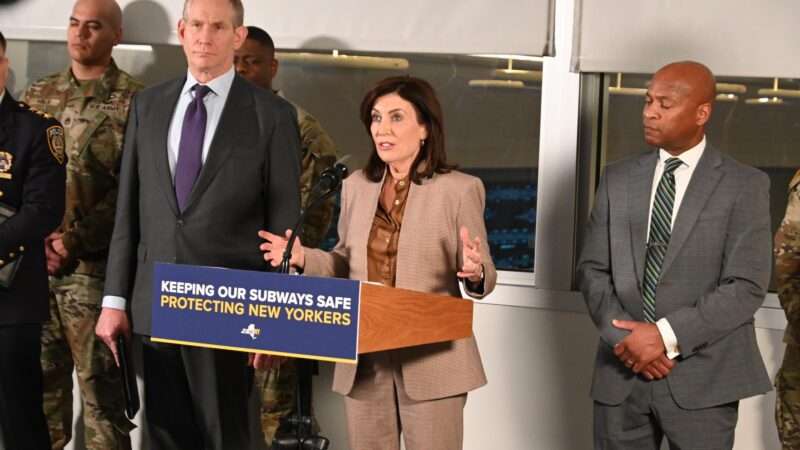
Welcome to the police state: Yesterday, New York Gov. Kathy Hochul announced that 750 National Guardsmen and 250 state police officers will be deployed to patrol the New York City subway system, Hochul's attempt at combating recent high-profile crimes, like the incident in which an A train conductor's neck was slashed last week.
Law enforcement will also start doing bag checks for straphangers, and will bar people who have been convicted of violent crimes against subway passengers from using public transit for three years. It's clear how the bag checks will be enforced (in a way that costs the city money and commuters time) but it's not clear how the ban on past offenders will be enforced.
This all comes in addition to the roughly 1,000 New York City Police Department officers who were deployed throughout the subway system last month, and the cameras that have been installed in roughly one-sixth of the subway cars. That was in response to a January spike in major crime—driven mostly by grand larcenies, which are thefts without force—compared with January 2023. But crime stats are notoriously hard to untangle, and just because police are deployed doesn't mean they're effective: Subway crime, which is tracked as its own category, was up 30 percent year over year in 2022 when compared with 2021, despite Adams choosing to deploy police patrols throughout the system.
Hochul's new initiative appears to have already started; when I was going through the Broadway Junction stop last night, which connects the A train to the L, I counted a greater density of law enforcement than I'd seen before.
Bag checks are already happening at Grand Central:
If you're going to introduce a bunch of new police officers and National Guard soldiers into the subway system, what is the point of having them all stand in the same place instead of riding trains and walking laps of stations? pic.twitter.com/dhpdgB3b2X
— Anthony LaMesa (@ajlamesa) March 7, 2024
But political stunts are different than good policing, and this looks more like the first.
Patrol politics: Interpreted as part of the power struggle between Hochul and New York City Mayor Eric Adams, this looks like an attempt by the governor's office to either undermine Adams or set the stage to be able to take credit for a decline in crime—if that is in fact what results, which is a big if.
Interpreted as a tactic by major Democrats in major cities to be responsive to people's crime fears, it looks a lot like pandering. Neither Adams nor Hochul is up for reelection this year, but the political tides feel like they're turning in a direction of even soft-on-crime liberals being dissatisfied with the status quo.
There is a vast middle ground between the two loudest types of New Yorkers: the "I ride the subway all the time and it's totally safe, what are you talking about?" and the "this city is a hellscape, I fear for my life every time I leave my house." The truth is somewhere in between: It is common to get on a subway car and have a crazy person yelling. Sometimes they're threatening, but infrequently. I see smoking inside the subway car or urinating inside the station every month or so. I've seen bum fights. I've noticed people passed out in front of the turnstile, blocking access, a few times before; it's hard to know if the person is dead or passed out, and what to do. (Nor is it lost on me that the above sentence is a crazy thing to have to write.)
These situations force hard questions: What do we owe to our fellow New Yorkers, especially those in severe need, who sometimes refuse to help themselves? Should we expect public spaces to be free of threat and despair and, if so, what policing or surveillance should be used to get there? Are these tradeoffs worth it?
But Hochul's plan probably doesn't address the actual issue, which has less to do with a criminal free-for-all and more to do with erratic mentally ill people who essentially use the subway system as free shelter, and sometimes act out with violence. "The [subway disorder] problem got worse in 2017, when Transit Police stopped enforcing loitering and related subway rules to keep homeless and mentally ill people and drug addicts from living and sleeping in the subway system. This was a simply a political choice," wrote Peter Moskos on X. "Before then, people using the system for shelter and not transit would be told to leave. Not arrested. But you can't stay here. After, they were told of shelter options. If they chose not to [accept], they were left alone. 95% chose to remain."
"The right to prohibit behavior on the subway that is permitted on the street (EG begging) was affirmed by Young v. New York City Transit Authority (1990). This was a hard fought battle by the MTA back in the days. It made a huge difference in crime & riders' Quality of Life," added Moskos (in a useful thread), who argued that "turning the subway into a defacto shelter isn't good for homeless people. Nor is it not fair to the rest of us who need to ride the subway."
Exiling mentally ill people from select public spaces doesn't sound like a solution that solves underlying needs. But it is a solution that possibly returns subways to the people who pay for them, and to their original use. Perhaps New Yorkers would instead prefer to have cops going through their handbags during rush hour so they can feel like the city has finally started to do something. The problem is that the something actually matters, and that random searches, which violate people's privacy, should not be taken lightly or instituted for political gain.
Scenes from New York: That's enough New York up above, I think. But here's a subway ad I saw yesterday. End microaggression discourse and return to real issues!

QUICK HITS
- "Corporations will have to share key details about their role in driving climate change and the threat that warming poses to their operations under a contentious proposal the Securities and Exchange Commission approved 3-2 on Wednesday over intense business opposition," reported The Washington Post.
- The U.S. is negotiating a six-week ceasefire deal between Israel and Hamas that Hamas is allegedly refusing to sign onto. Both Qatar and Egypt are also helping to broker it, and all parties view the holy month, Ramadan, as an urgent and looming deadline.
- Armed gangs in Haiti are putting pressure on the country's prime minister, Ariel Henry, to resign, and it looks like the country may be heading toward a civil war. So far, gangs have set a bunch of prisoners free, seized the airport, and attacked a police academy.
- "Alabama Gov. Kay Ivey swiftly signed legislation on Wednesday passed by the state's GOP-controlled legislature giving physicians who provide in vitro fertilization civil and criminal immunity for any death or damage to embryos," reported Politico.
- Inside the Satoshi Nakamoto trial in the U.K., which aims to figure out who actually created bitcoin.
- Linwei Ding, a Google employee in the U.S. who is originally from China, was just charged with stealing AI trade secrets that he was allegedly feeding to two Chinese companies.
- In the Elizabeth Warren formulation of the world, high prices are attributable to greed. So maybe landlords actually just magically became less greedy?
Austin built a shit ton of new housing and now rent is falling 7% year-over-year pic.twitter.com/BI0tWoSkU8
— Alec Stapp (@AlecStapp) March 6, 2024
The post Empire State Police State appeared first on Reason.com.







